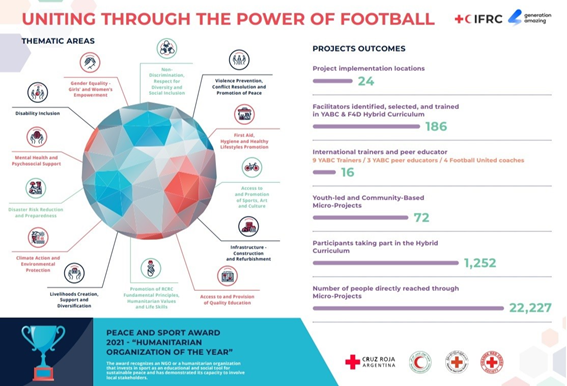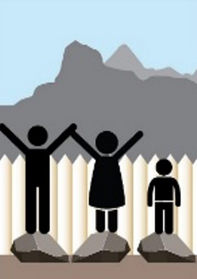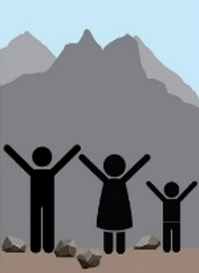In this blog post, part of the NORRAG Blog Series on the Role of Quality Education in Building Just and Sustainable Peace, Amjad Mohamed-Saleem, Protection, Inclusion and Engagement Manager at the International Federation of the Red Cross and Red Crescent Societies (IFRC), discusses the positive impact sport and life skills have on young people, specifically as a way to counteract the effects of the COVID-19 pandemic, which has led to the social isolation for that group. Mohamed-Saleem refers to results from youth empowerment projects led by IFRC in partnership with Generation Amazing – Qatar 2022’s Supreme Committee for Delivery & Legacy.
15% of the world’s population – some 1.2 billion people and counting – are aged between 15 to 29. The COVID lockdown has disproportionately affected people’s lives, especially millions of young people worldwide, with public health restrictions and socio-economic disruptions having a devastating impact on their education, mental health, career prospects, safety, and personal development.
Initially, children, adolescents and young adults were considered less vulnerable to the virus, but developments during the pandemic have shown otherwise. A World Vision investigation, revealed three key factors that COVID-19 has changed in the lives of children and young people on a massive scale: school disruption, emotional distress due to social distancing and increasing poverty (World Vision International, 2020). The research highlighted isolation and loneliness of young people because of school closures, on top of the disruption of their learning and daily routines. In addition, there is an acknowledgement of emotional distress and troubling feelings, linked to the uncertainty about how long the crisis and imposed isolation would last and the disruptions already caused to education, livelihoods, development, safety and mental health. The pandemic has also exacerbated the mental well-being of young people (WEF, 2021) leading to greater aspects of depression, illness, disability and suicide. To counter the repercussions on mental health in youth, reports (WEF 2021) suggests lifting the measures that have led to the social isolation of young people and makes a case for sleep and exercise which are effective in boosting mental health. Given the longstanding recommendations from medical professionals about sleep and physical exercise, it is pertinent that sports for development and peace projects can provide good examples to authorities and policy makers especially in the education and health sectors, to ensure that children, adolescents and young adults are taught techniques and approaches on life skills and enjoy a physical activity (whilst providing opportunities to do some social enterprises and community work) to help them sleep better and also have a better balance of mental health and social engagement. In addressing mental health issues of young people, it must be realized that this is a whole of society issue rather than just a youth issue.
Whilst there have been some critical lessons taught by the COVID-19 crisis, the importance of transformation and innovation have been made possible. The concept of remote and hybrid education, which became a necessity when the pandemic hit, provides the potential to transform the future of learning if systems are strengthened and technology is better leveraged to complement skilled and well-supported teachers.
In addressing the current challenges to do with youth isolation, exclusion, and violence prevention, the International Federation of Red Cross and Red Crescent Societies (IFRC) has spearheaded a new project in partnership with The Supreme Committee for Delivery & Legacy of Qatar 2022 (SC) – Generation Amazing (GA). The project is a unique hybrid of football for development skills (F4D) and Youth as Agents of Behavioural Change (YABC) and complemented through community micro projects. F4D is GA’s flagship programme that empowers and educates future generations around the globe to address three priority issues: vulnerability, health and wellbeing, and environmental sustainability. YABC is the IFRC’s flagship humanitarian education[1] initiative on the promotion of a culture of non-violence and peace (CNV+P), that empowers young people to take up an ethical leadership role in inspiring a positive transformation of mindsets, attitudes, and behaviors, both within themselves and their communities. It is built on three pillars: empowerment, operating from inner peace, and reaching out to the community.
The new project YABC/F4D project, “Uniting through the power of football’ consists of a hybrid curriculum that has been developed to combine the (Y)ABC methodology and F4D approaches to use football as a driver for social change, developing youth leadership and inculcating a social entrepreneurship spirit through micro projects. The project is intended to mobilize vulnerable at-risk young people and communities in out-of-school activities to help prevent the occurrence of violence, improve their access to education and employment, ensure better social inclusion and build resilience in excluded at-risk communities, leading to healthy lifestyles, greater engagement, fewer problems with peers, and increased pro-social behaviour. Through the project, young people will not only experience personal transformation but create an external ripple of change through community work whilst playing and learning about football. As they navigate their leadership journey, they will learn powerful skills around discipline, healthy living, teamwork, and engage with their local networks in meaningful ways. By doing so, they will create change in their schools, neighbourhoods, and the broader world by implementing solutions to some of the most challenging problems of our time from a community-based lens and with the initiator of this being the F4D methodology combined with YABC approach and additional basic educational processes. The project will involve thousands of young people in this process and will in turn create thousands of solutions directly implemented by young people.
The project is currently being trialed with Red Cross Red Crescent National Societies in Argentina, Uganda, Myanmar, and Iraq testing outcomes identified in the multi-country project design to assess the effectiveness and impact of combining the IFRC’s (Youth as) Agents of Behavioural Change ((Y)ABC) and GA’s Football for Development (F4D) initiatives. With the onset of COVID lockdowns, much of the hybrid curriculum has had to be adopted for the online space with IFRC YABC trainers. As the project unfolds, it expects to have an impact on the improvement in the social inclusion of marginalized and excluded youth, particularly those living in at-risk communities, refugees, and internally displaced young people, as well as in host communities, by recruiting disadvantaged youth to participate in football driven leadership development programmes. The programme puts forward a community-based model of resilience using team sports to address issues of identity, belonging and cultural isolation whilst also encouraging locally sourced ideas to address community problems which are then supported through small community micro projects. It aims to prove that with the provision of life and leadership development skills, as well as learning opportunities to vulnerable and excluded community-based young people through an integrated F4D and (Y)ABC skills training programme, the of enhancement of local capabilities coupled with an opportunity to solve real community issues, will help young people drive social change on the ground and take responsibility for those actions. This will ultimately lead to an enhanced well-being and personal resilience of vulnerable youth.
So far the results speak for themselves (see the figure below). In 24 locations in 4 countries, 186 facilitators have been trained in delivering the hybrid curriculum. 1252 participants have taken part in the Hybrid curriculum developing 72 youth led and community based micro projects reaching around 22,300 people. All of this within the space of a year under COVID restrictions and in the case of Myanmar, uncertainty caused by political instability.

One of the facilitators from Myanmar has described this project as “light in the midst of darkness”, whilst another participant from Uganda, a refugee who had fled conflict, expressed his feeling that “with this project, I have the chance of expressing my talent and being useful to the community once again”. What has been also unique about the project is not just the change in those attending the programmes but also for the community who have also benefitted from the trainings and micro projects. As a mother from one of the branches in Argentina stated, “the pitch has become a safe space for everyone to come and mix and overcome division. By also participating with our children in these workshops, this has changed how we interact as parents”. The National Societies themselves have also noticed that change as this statement from the Iraqi Red Crescent testifies “The National Society was able to detect a significant change in the attitudes and behaviours of participants and the success of the project in fostering the ‘spirit of cooperation among all and the sense of belonging to the society”.
IFRC and GA believe that young people represent the single greatest untapped resource for good across the globe. They are ready to change the world. Through this project both partners want to show that sport and life skills will equip this generation of young people with the necessary skills and mindset to change the world for the better –not someday in the future –right now. They are hungry to lead and imagine innovative approaches to make their communities healthier, safer, and more inclusive, while writing new narratives of who they are and what they are capable of.
Amjad Mohamed-Saleem, is the Protection, Inclusion and Engagement Manager at the International Federation of the Red Cross and Red Crescent Societies.
[1] Humanitarian education (HE): education that enables individuals – especially children, adolescents and young adults – to interpret situations from a humanitarian perspective and develop the knowledge, values and skills that empower them to take action in the spirit of the Fundamental Principles, helping and caring for themselves and others, and thereby contributing to building resilience, social inclusion and lasting peace in their family, community and society.
this originally appeared here



